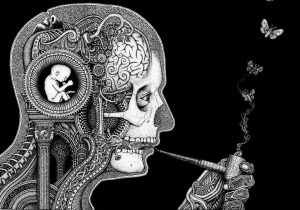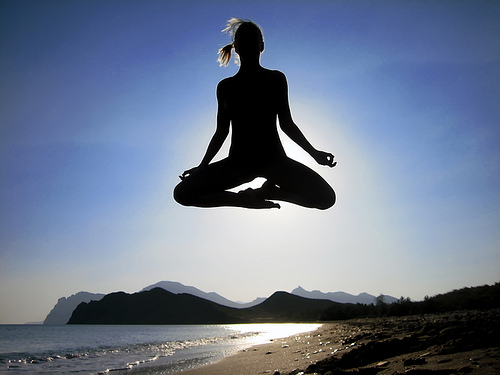The greatest scientific quest of the 21st century has been (and continues to be) a “theory of everything” that ties general relativity and quantum mechanics together. The missing link between the two is a quantum description of the gravitation force that we are all very familiar with.
I’ve been thinking a lot lately about a similar notion of a “philosophy of everything.” That is, a common philosophy that encompasses economics, politics, and science, and melds it all into a general meaning for our existence on this microscopically small revolving blue rock in the middle of a vast universe.
It seems that the “tie that binds” it all together is consciousness. I know that might sound weird, but more and more that’s what “they” are saying. By they I mean many of the current notable philosophical and spiritual thinkers (and even some scientists). After all, one of the greatest mysteries in science, in addition to quantum gravity, is the nature of consciousness…what exactly is it and where did it come from? The conundrum of consciousness is akin to the what came first, chicken or egg, riddle. That is, does the mind (i.e., our biological brain) produce consciousness, or vice versa. In fact, there is growing evidence that the root of reality is indeed, consciousness.
The spiritual, philosophical and scientific thinkers that I’m referring to are the likes of neuroscientist, Sam Harris, spiritual guru, Baba Ram Dass, historian and philosopher, Yuval Noah Harari, among others.
Particularly illuminating to me as of late has been the trilogy of books by Yuval Noah Harari. Those are, in order of their publication, Sapiens, Homo Deus, and his latest book, 21 Lessons for the 21st Century. If you haven’t read them, you certainly should.
Harari tell us that humans now live in a dual reality. Actually, we’ve sort of been living in one since the dawning of civilization, which encompasses only 1/3 of 1% of the 1.5 million year history of our species. There’s the objective reality of the things we can see, touch, taste, hear and smell. And then there’s this fictional layer of reality that has been superimposed by us over that objective reality. The fictional layer is comprised of made-up stories…yea that’s right, fairy tales, more or less.
Now, even though these stories are not really real, they nevertheless have had enormous impacts upon our species. In fact, Harari tells us that these stories are what has allowed mass human cooperation, which has elevated our species above the 9 million or so others that share space with us on planet Earth. Of course, one of the main categories of stories has to do with religion, but there are many others as well…such as democracy, capitalism, socialism, human rights and even money. All these have no objective existence apart from the stories that we’ve made up and that have become widely accepted.
And that’s not necessarily a bad thing…to a point.
Of course, the story of money has been a great benefit to humankind. Even though these small scraps of paper, generally adorned with grainy images of dead notables, do not have any intrinsic value in and of themselves…well, perhaps to light a fire, or substitute for Scott tissue versus dried leaves on an ill-equipped camping trip…they have facilitated widespread economic cooperation that has had great benefits to human society writ large.
But here’s the thing, the stories have now taken on such an elevated and integrated role in human society that in many ways they now command objective reality itself. Take the capitalist economic story that led to the great industrial revolution that swept across the globe and elevated the quality of life for billions. We have come to realize, through science, that this story and the cooperative action it has spawned across the human race is now actually commanding the objective reality of our planet’s climate…to the potential risk of our very extinction!
Political and religious stories have been both good and bad. While they have given birth to nations and inspired the exploration of new geographic frontiers, they have also given rise to massive and completely unnecessary wars, death and mayhem.
On the level of the ego, which is the level of consciousness where most of us mere mortals live on a day-to-day basis, these stories reign supreme. They deeply influence our almost every conscious thought and thus command the actions flowing from those thoughts.
In short, these stories are powerful things, both for good and for bad.
However, the ego level is only one lower level of consciousness. There are higher ones. I know that might sound a little “out there” for some who could be reading this. But if you’ve ever tried meditation you’ll quickly learn that you’re really not in control of your thoughts at all. The stories are in control, as well as parts of your brain that have evolved over million of years and still harbor fight or flight notions that dominated the consciousness of our distant cave-dwelling ancestors. The goal of meditation is to quiet all that down and reach a higher level of consciousness where the stories in fact do NOT reign supreme. And that is inherently achievable, as millions of meditators do it quite successfully as a daily practice.
The philosophy of everything that I’m alluding to is one in which this higher level of consciousness, as the root of objective reality, is that which gives meaning to our existence. It is the tie that binds everything together, regardless of which stories we might have individually bought into. At this unifying level of consciousness we feel compassionate towards our fellow humans. We do not allow stories to distract us from our inherent commonality.
The stories are currently causing widespread division in American society and an alarming lack of compassion between those clinging to these competing fictions, such as democrat and republican.
We can seek a higher level of consciousness in which these stories do not command our inner, nor our outer, objective realities.
We may be at a point where our future existence depends on a philosophy of everything that leads us to do just that.





